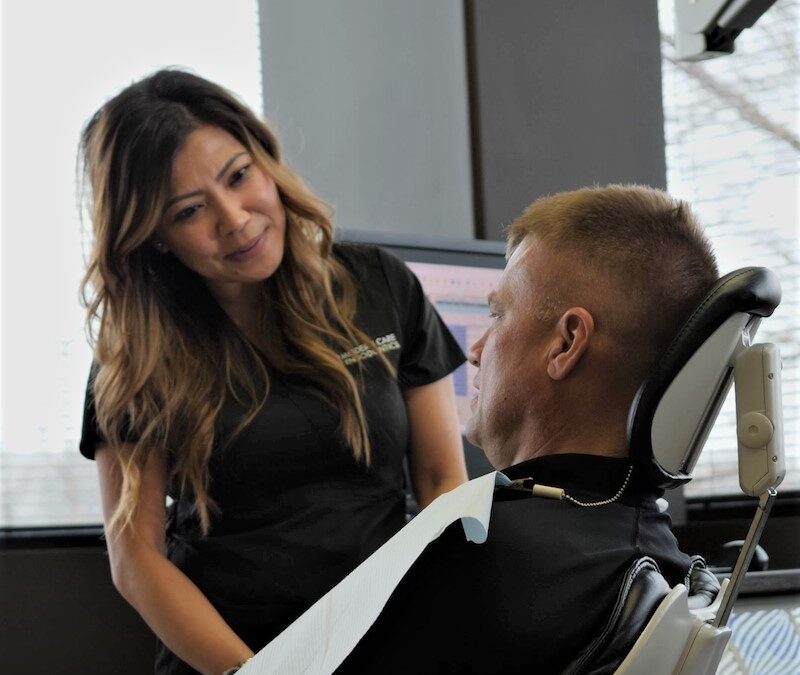Endodontic treatments are more common than you may think. According to the American Association of Endodontists, more than 15 million root canal procedures are performed annually in the United States. At Modern Care Endodontics, we understand that needing a root canal or other endodontic treatment can raise many questions. To help you feel more comfortable and informed, we have compiled answers to some of our patient’s most common questions. Whether you are curious about the procedure or have questions about what to expect, we have the answers. So, let us get started and answer your root canal FAQs.
1. How Did My Nerve Go Bad?
Your tooth’s nerve can become damaged or infected due to deep decay, a crack or chip in the tooth trauma, or even repeated dental procedures on the same tooth. When bacteria reach the pulp inside your tooth, it can lead to inflammation, infection, and, eventually, the need for root canal treatment.
2. If I’m Not Having Any Pain, Do I Still Need a Root Canal?
Yes, sometimes you may not experience pain even if the nerve of your tooth is damaged or infected. It is essential to treat the infection before it spreads or leads to more severe issues, which can happen without noticeable pain.
3. I Thought I Was Done with the Root Canal—Why Do I Need a Crown?
After a root canal, teeth and larger fillings, teeth can be more susceptible to fractures. A crown is necessary to protect the treated tooth and restore its full function, preventing further damage.
4. Is a Root Canal Painful?
Modern advancements in dental technology and techniques have made root canal procedures relatively painless. At Modern Care Endodontics, we use advanced procedures and technology that effectively eliminates pain during the procedure.
5. How Much Pain Am I Going to Have After Treatment, and What Does It Feel Like?
Feeling some discomfort after a root canal is normal as your body heals. The pain is typically mild; patients can usually manage it with over-the-counter pain relievers. It may feel like a slight soreness or tenderness in the treated area, similar to the sensation after a filling.
6. Do You Remove the Whole Root of My Tooth?
No, during a root canal treatment, we remove the infected or damaged pulp from inside the canals. The pulp contains blood vessels, nerves, and connective tissue. After removing the pulp, we clean and disinfect the area, then fill and seal the canals. Your roots remain intact to support your tooth.
7. What Is the Difference Between a Root Canal and a Regular Filling?
While dentists use fillings to repair minor tooth decay, a root canal is necessary when the decay or damage reaches the tooth’s pulp, causing infection or inflammation.
8. How Long Does a Root Canal Procedure Take?
Root canal treatment may take between 45 minutes-90 minutes.Some may take two visits depending on the tooth and situation. However, at Modern Care Endodontics, we use advanced techniques, which generally completes the root canal in one visit.
9. Is There an Alternative to a Root Canal?
The main alternative to a root canal is tooth extraction. However, preserving your natural tooth is usually the best option, as it helps maintain your overall natural dental function and oral health.
10. Can I Eat After a Root Canal Procedure?
It would help if you waited until the numbness wore off before eating to avoid accidentally biting your tongue or cheek. Stick to soft foods initially and avoid chewing on the treated tooth until a crown is placed over it.
11. How Successful Is Root Canal Treatment?
Root canal treatments have a high success rate, and most patients enjoy long-term relief and preservation of their natural teeth.
12. What Should I Do If I Experience Swelling or Discomfort After a Root Canal?
It is normal to experience mild discomfort after a root canal. However, if you notice significant swelling or pain, it is important to contact us so we can help minimize any discomfort or swelling that occurs.
13. How Do I Care for My Tooth After a Root Canal?
Brush and floss regularly after a root canal to maintain good oral hygiene and avoid chewing hard foods until your dentist places a crown over your tooth to protect it from further damage.
14. Can a Root Canal Fail? What Are the Signs?
While root canal treatments are generally successful, complications can lead to treatment failure. For example, if a tooth has an extra root canal your dentist did not detect, bacteria can grow in the untreated canal, leading to infection. It is generally not the dentist’s fault. This problem can occur when more specialized equipment and the expertise of an endodontist are required to detect the other root canal. Other factors such as a leaking crown may also cause the treatment to fail. It is important to have your tooth assessed and follow any restorative recommendations for your tooth. For more information about root canal retreatment, please read our blog, Why Root Canal Retreatment May Be Necessary.
Final Words on Root Canal FAQs from Your Endodontists

We hope this blog on root canal FAQs has answered your questions. At Modern Care Endodontics, we aim to ensure you feel informed and confident about your treatment. If you have any additional questions or concerns, don’t hesitate to contact our team. Contact us today. We’re here to help you every step of the way.
Your Friendly Team at Modern Care Endodontics
Contact Us at: Phone: 952-920-4400

